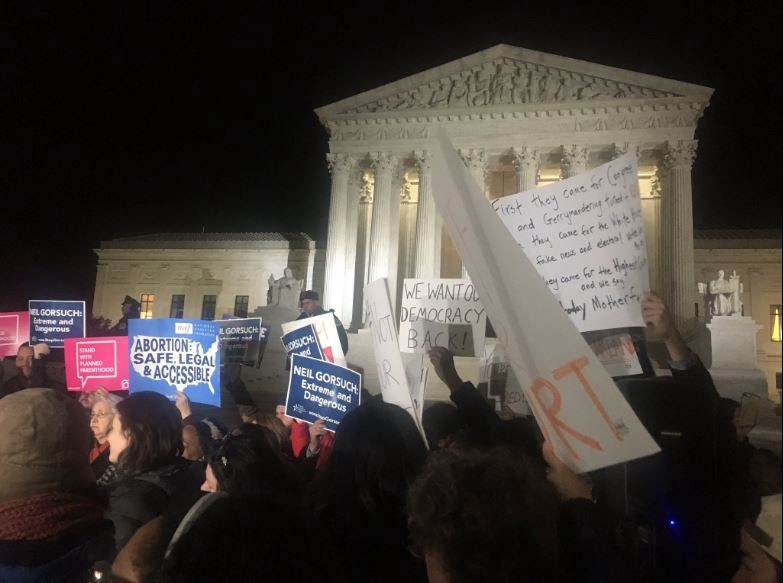WASHINGTON, D.C. — Shortly after President Trump announced his decision to nominate Neil Gorsuch to the U.S. Supreme Court, the plaza in front of the marble-columned Washington landmark was packed with people.
“No Roe, no go,” they chanted loudly, referring to the Supreme Court’s 1973 Roe v. Wade decision upholding a woman’s right to abortion.
Some held signs proclaiming: “Remember Merrick Garland,” while others declared their support for a woman’s right to choose and spoke passionately about how the future of abortion access stands on the line if Gorsuch were to be confirmed.
“He will overturn Roe v. Wade, and that’s my big fear,” said 37-year-old Charlotte McConnell, a mother and aspiring politician who also volunteers as an ambassador for Planned Parenthood. “That is an absolute impossibility, and I will not stand for that.”
Gorsuch, currently a federal judge on the United States Court of Appeals for the Tenth Circuit, is an anti-abortion hardliner. Last year, he put a procedural tactic to unusual use in a case attempting to defund Utah’s Planned Parenthood affiliate, providing a clue into how he would treat the largest provider of women’s health care from the high court.
“Although it was a procedural move… he was putting forward misinformation in order to try to take away access to health care and services,” Jacqueline Ayers, Planned Parenthood’s director of legislative affairs, told ThinkProgress outside the Supreme Court. “It shows us that Gorsuch has a history of not standing on the side of reproductive health care and rights, and we are deeply concerned.”
Another case in 2013 also highlighted Gorsuch’s contempt for reproductive health. That year, Gorsuch joined the appeals court’s ruling in favor of Hobby Lobby, showing how far he is willing to use “religious freedom” to protest women’s reproductive rights. Gorsuch ruled — and the Supreme Court eventually agreed — that the federal government could not force closely held corporations like Hobby Lobby to provide contraceptive coverage as part of their employer-sponsored health insurance plans.
Immediately after the Hobby Lobby decision, thousands of women had their health care options limited.
McConnell, who traveled to the Supreme Court from Sterling Virginia, said Gorsuch’s record shows how he “holds religion over our Constitution and Bill of Rights.”
“The separation of church and state is necessary, and I think that it is crucial when we’re talking about abortion,” she said. “I think he’s always going to side with his religion, and that’s unacceptable.”
While Roe v. Wade won’t necessarily be overturned under Trump if the Senate were to confirm Gorsuch, his nomination could lay the groundwork for a future with restricted abortion access. If Trump were to name a second or third justice, the future of Roe would look bleak.
That’s why Planned Parenthood, NARAL, and other women’s health advocacy organizations said they came to protest at the Supreme Court Tuesday night.
“We came out here to send a message to the full Senate,” Ayers said. “No nominee should be moved to the court if they don’t support Roe v. Wade.”

With so many issues on the chopping block if Gorsuch is confirmed to the court, McConnell said she finds it troubling that abortion access has to be re-litigated, decades after Roe v. Wade.
“There are a lot of fights that need to be fought right now, so it makes me worried that we’re going to have to return to back-alley abortions, and that is not right,” she said.

